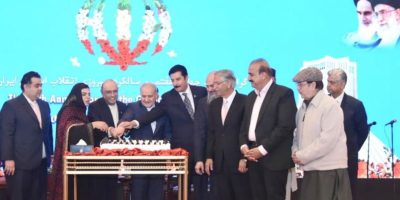India not committed to better relations with Pakistan, Khokhar

ISLAMABAD, APR 13 /DNA/ – “You are not dealing with a country that is committed to better relations with Pakistan. India wants domination of Pakistan the way it has dominated all its other neighbours,” said Ambassador Riaz Khokhar. The former foreign secretary of Pakistan was speaking at a webinar titled ‘India and South Asia in Contemporary Times’ organized by the Institute of Regional Studies (IRS) here on Tuesday.
Ambassador Khokhar maintained that there was a fundamental consensus in India on not giving any concessions to Pakistan on any major issues, especially Kashmir. He added that this consensus among Indian decisionmaking circles was a not a new construct and had been there since Nehru’s time. He urged the decisionmakers in Pakistan to assess whether Pakistan was in a strong position to negotiate with India on its terms. He was of the view that India would not concede to Pakistan on anything, even the low-hanging fruit, if it would consider itself in a position of strength.
Ambassador Khokhar stated that India was not ready to go back on its actions of 5th of August 2019 in Kashmir. Therefore, he urged the decisionmakers of Pakistan to be clear on the deliverable of any talks with India. He was of the opinion that if the talks would deliver the status quo on Kashmir, it would not solve anything for Pakistan. He further urged Pakistan to be clear on what India had to offer and what the people of Pakistan and the Indian Illegally Occupied Jammu and Kashmir (IIOJK) would get out of any dialogue with India. He added that there seemed to be a lack of consensus or clarity on India in Pakistan.
Ambassador Khokhar argued that there were four parties to the Kashmir dispute: India, Pakistan, Kashmiris, and the international community. He cautioned the Government of Pakistan against arrogating to itself the right to compromise on its longstanding internationally-recognized principled position on Kashmir as well as its commitment to the Kashmiris. He further cautioned the Government of Pakistan against trading a compromise on the rights to Kashmiris for good neighbourly relations with India. “The future of Kashmir should be determined by the Kashmiris,” he said.
Commenting on the hegemonistic regional approach of India, Ambassador Khokhar shared that India had a troubled history not only with Pakistan but all its neighbouring countries. He further stated that India was never a truly secular country, even under the long Congress rule, but Prime Minister Modi had ushered in an era of unapologetic Hindutva ultra-nationalism. He added that the BJP was deeply committed to Hindutva and aspired to mainstream the RSS ideology through a re-engineering of the Hindu society, which needed to be clearly understood in Pakistan.
Ambassador Khokhar said that the Government of India had abolished the only Muslim majority state in India, i.e., IIOJK, and did not care about Muslims because they were thinly spread out geographically. He further added that the Muslim community lacked leadership and there was no other political force at the national level that could confront Modi’s BJP. He was of the view that the Hindu majority of India was rallying behind the BJP’s majoritarian Hindutva nationalism because it was propagated and accepted as riddance from thousands of years of humiliation at the hands of ‘foreigners’.
Moving forward, Ambassador Khokhar urged the Pakistani decisionmakers to proceed with caution in negotiations with India and keep consulting the people of Kashmir. He further maintained that India needed to reciprocate with positive gestures before any forward movement on the dialogue. He suggested easing of restrictions in Kashmir, release of all Kashmiri political detainees, and allowing Kashmiri leadership to travel abroad as the initial goodwill gestures from India for seriousness in negotiation with Pakistan.
President IRS Ambassador Nadeem Riyaz thanked Ambassador Riaz M Khan for his very educative and enlightening presentation.
Related News

Pakistan assures BAT of policy reforms to curb Illicit tobacco trade
ISLAMABAD, FEB 12 /DNA/ – Federal Minister for Finance and Revenue, Senator Muhammad Aurangzeb, heldRead More

President warns escalation involving Iran could destabilize region
DNA ISLAMABAD, President Asif Ali Zardari on Wednesday welcomed the efforts aimed at easing tensionRead More


Comments are Closed